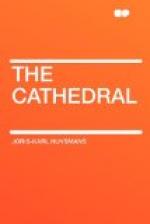And facing these chambers of the soul, dim with mist, he was struck by a strange association of the Revelations of Saint Theresa and a tale by Edgar Poe.
Those chambers of the inner man were empty and cold, and like the halls of the House of Usher, surrounded by a moat whence the fog rose, forcing its way in at last and cracking the worn shell of wall. Alone and uneasy, he prowled about the ruined cells, with closed doors that refused ever to open again; thus his walks about his own mind were very limited, and the panorama he could see was strangely narrowed, shrunk close and near to him, almost nothing. And he knew full well that the ruins surrounding the central cell, the Master’s Room, were bolted and fastened with rivets that could not be unscrewed, and triple bars—inaccessible. So he restricted himself to wandering in the halls and passages.
At Notre Dame de l’Atre he had ventured further; he had gone into the enclosure round about the abode of Christ; he had seen in the distance the frontiers of Mysticism, and, too weak to go on his road, he had fallen; and now this was to be lamented, for, as Saint Theresa truly remarks, “in the spiritual life, if we do not go forward, we go back.” He had, in fact, retraced his steps, and lay half paralyzed, no longer even in the vestibule of his mansion, but in the outer court.
Till this time the phenomena described by the matchless Abbess had been exactly repeated. In Durtal, the Chambers of the Soul were deserted as after a long mourning; but in the rooms that had remained open, phantoms of sins confessed, of buried evil-doing, wandered like the sister of the tormented Usher.
Durtal, like Edgar Poe’s unhappy sufferer, listened with horror to the rustle of steps on the stairs, the piteous weeping behind the doors.
And yet these ghosts of departed crimes were no more than indefinite shapes; they never consolidated nor took a definite form. The most persistent miscreant of them all, which had tormented him so long, the sin of the flesh, at last was silenced, and left him in peace. La Trappe had rooted up the stock of those debaucheries. The memory of them, indeed, haunted him still, on his most distressing, most ignoble side; but he could see them pass, his heart in his mouth, wondering that he could so long have been the dupe of such foul delusions, no longer understanding the power of those mirages, the illusions of those carnal oases as he met them in the desert of a life shut up in seclusion, in solitude, and in books.
His imagination could still put him on the rack; still, without merit, without a struggle, by the help of divine grace, he had escaped a fall ever since his return from the monastery.
On the other hand, though he had, to some extent, emasculated himself, though he was exempt from his chief torment, he discerned, flourishing within him, another crop of tares, of which the spread had till now been hidden behind the sturdier growth of other vices. In the first instance, he had believed himself to be less enslaved by sin, less utterly vile; and he was nevertheless as closely bound to evil as ever, only the nature and character of the bonds were different, and no longer the same.




